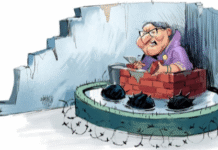Key Points
- The effects of authoritarianism are amplified and obfuscated by growing economic interconnectivity. Combating authoritarianism and addressing the dark networks that support its consolidation are the unavoidable strategic challenges to global security.
- The authoritarian-corruption nexus is the growing convergence of licit and illicit state and non-state actors that facilitates and launders the profits of illegal activity, reinforcing the strength and survival of authoritarian systems of governance everywhere. It depends on and resides in the complex and rapidly changing global economic currents flowing in and out of American markets and is the defining threat to freedom in the 21st century.
- Domestic and international efforts are needed to dismantle the authoritarian-corruption nexus, including addressing the (ab)use of anonymous shell corporations and reestablishing the Group of Seven.
Executive Summary
The end of the Cold War was the beginning of a new era: one in which conflict occurs less in proxy wars and grand ideologies but more in trade wars and boardrooms. For the foreseeable future, turmoil around the world will be driven by competition between free societies and the authoritarian-corruption nexus. The authoritarian-corruption nexus is the growing convergence of licit and illicit state and non-state actors that facilitates and launders the profits of illegal activity, reinforcing the strength and survival of authoritarian systems of governance everywhere.
Modern dictators require more than good stories and parades to garner loyalty from elites and subdue publics. Ideologies certainly remain important in contemporary authoritarian politics, especially nationalism and Salafi-jihadism, but their role is weaker and more individualized due to the internet. Authoritarian survival now depends more on procuring currencies, goods, and services that can be strategically redistributed to regime loyalists.
Economic entanglement with authoritarian states must be scaled back, diversified, and diverted to states with the capacity and willingness to compete on a level playing field. Failing to disentangle will continue to introduce destabilizing security risks while intensifying the effects of economic inequality. The opportunity costs of long-delayed investments at home and among rule of law allies create domestic tension, while the authoritarian-corruption nexus facilitates disparate, global threats to security such as nuclear proliferation, international terrorism, supply-chain risk, and media disinformation campaigns.
The solutions to dismantling the authoritarian-corruption nexus reside in democratic capitalism and must be pursued at the domestic and international levels to succeed. Domestic efforts should include addressing the (ab)use of anonymous shell corporations, federalizing the Treasury’s Financial Crimes Enforcement Network, lifting the Patriot Act’s exemption on real estate, upgrading US foreign trade zones, reevaluating the Foreign Agents Registration Act, and giving the private sector a greater role in anti-corruption efforts. On the international stage, the US should seek to reestablish the Group of Seven as a formal institution for developed democracies and revise the processes of the Financial Action Task Force to fight trade-based money laundering.
Introduction
The end of the Cold War was the beginning of a new era: one in which conflict occurs less in proxy wars and grand ideologies but more in trade wars and boardrooms. For the foreseeable future, turmoil around the world will be driven by competition between free societies and the authoritarian-corruption nexus. The checked and balanced nature of decision-making in America has delayed our official entry into the fight, but the tipping point is coming, and it is time to prepare.
The lights are flashing red everywhere. Yet there is nowhere near a consensus on what the big-picture struggle is or what to do about it. China, Iran, North Korea, and Russia are all clearly national security hot spots. Reports of military buildups and irredentism reach the desks of presidents, prime ministers, and CEOs daily. But guns are not the only underlying security concern; insecure supply chains are another growing problem. Intellectual property theft, immigration crises, and illicit financial flows all pose related security risks to governments and businesses that strain budgets, damage bottom lines, and ultimately tear at the social fabric of free people everywhere.
The authoritarian-corruption nexus is the growing convergence of licit and illicit state and non-state actors that facilitates and launders the profits of illegal activity, reinforcing the strength and survival of authoritarian systems of governance everywhere. It depends on and resides in the complex and rapidly changing global economic currents flowing in and out of American markets. It is the defining threat to freedom in the 21st century. If it is not effectively addressed, the costs will be immense.











